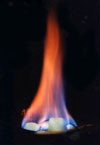
The rapid climate change underway in the Arctic has the potential to disrupt weather patterns around the planet, and brings with it the risk that methane bubbling out of the permafrost that rings the Arctic Ocean and from gas hydrates under the sea floor could make our attempts to restrain emissions and stabilise atmospheric greenhouse gases completely irrelevant. These concerns will not be news to Hot Topic regulars (try the methane and Arctic tags for earlier posts and background), but a thorough overview by Fred Pearce in last week’s New Scientist (Arctic meltdown is a threat to all humanity) pulls all the threads together and presents them in a compelling fashion. Pearce begins by looking at the experiences of Katey Walter:
“I am shocked, truly shocked,” says Katey Walter, an ecologist at the University of Alaska in Fairbanks. “I was in Siberia a few weeks ago, and I am now just back in from the field in Alaska. The permafrost is melting fast all over the Arctic, lakes are forming everywhere and methane is bubbling up out of them.”
Back in 2006, in a paper in Nature, Walter warned that as the permafrost in Siberia melted, growing methane emissions could accelerate climate change. But even she was not expecting such a rapid change. “Lakes in Siberia are five times bigger than when I measured them in 2006. It’s unprecedented. This is a global event now, and the inertia for more permafrost melt is increasing.”
Not good news.
Continue reading “The inner mounting flame”
Like this:
Like Loading...
 The synthesis report from the Copenhagen climate congress of scientists held in March has been released. It updates the 2007 IPCC report in the light of the latest developments in the science, and means that the UN Copenhagen conference in December will have an overview of the state of our current understanding of climate change. Â
The synthesis report from the Copenhagen climate congress of scientists held in March has been released. It updates the 2007 IPCC report in the light of the latest developments in the science, and means that the UN Copenhagen conference in December will have an overview of the state of our current understanding of climate change. Â 


